Rey At Risk: Keeping Lucasfilm Accountable to Her Potential
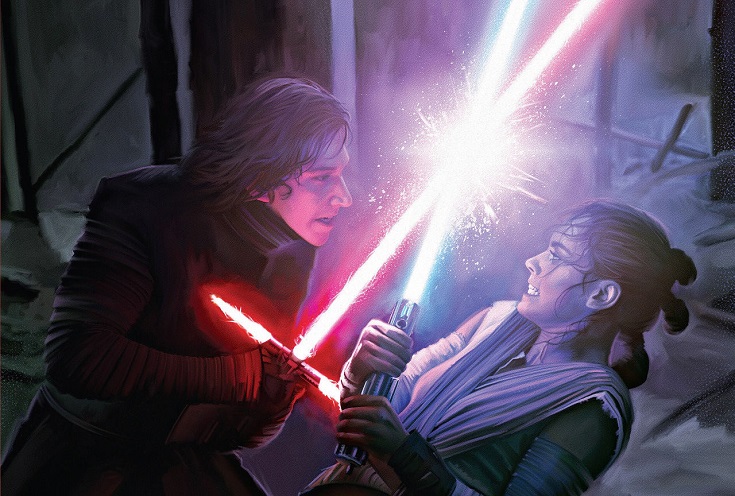 For fans who’ve always wanted to see a female character take the lead in a Star Wars movie, and who’ve dreamed about a female Jedi as the central protagonist in the kind of heroic journey that has shaped each of the two prior film trilogies, The Force Awakens delivered an amazing heroine, Rey. From beginning to end Rey is fantastic, as is the performance of Daisy Ridley. Rey already has become a huge hit with fans, from online praise to cosplay and fan art.
For fans who’ve always wanted to see a female character take the lead in a Star Wars movie, and who’ve dreamed about a female Jedi as the central protagonist in the kind of heroic journey that has shaped each of the two prior film trilogies, The Force Awakens delivered an amazing heroine, Rey. From beginning to end Rey is fantastic, as is the performance of Daisy Ridley. Rey already has become a huge hit with fans, from online praise to cosplay and fan art.
At the same time, however, much of the discussion about Rey in the movie’s aftermath has involved topics other than how great her character is, or what kind of Jedi she’s going to become. Rather than being able to focus on Rey herself, fandom is distracted by collateral issues that raise questions – often implicitly, sometimes overtly – about whether Lucasfilm is truly committed to fulfilling Rey’s potential as the apparent Jedi heroine central protagonist in the Sequel Trilogy. While most fans would love to be optimistic about Lucasfilm’s intentions, the present and past of the franchise provides too many doubts to enable unhesitating confidence that Rey’s potential will not inadvertently be squandered, like so many important female Star Wars characters before her.
For that reason, it is imperative for fans not only to continue to praise Rey and the successes she has achieved, but also to speak up about our apprehensions for her future. Amid an official half-year delay in release and rumored additional rewrites to the script, Rey’s portrayal in Episode VIII – and certainly Episode IX – is far from set in stone. Fans can vote with their dollars, but by then it is too late. Only holding Lucasfilm accountable for their choices with Rey’s characters beforehand can prevent another female character fiasco.
Marketing Mystery Box
Now that the movie has been released, multiple official sources have confirmed that Rey as the central Jedi protagonist was one of the very first ideas solidified in Episode VII’s earliest development. That decision, already made, was part of Kathleen Kennedy’s recruiting pitch to bring J.J. Abrams aboard as director. On EW’s Behind the Scenes podcast, credited screenwriter Michael Arndt described the entire Sequel Trilogy arc as the origin story of a female Jedi. Rey as the core character to the story was in place from the very beginning.
And yet Lucasfilm ensured that Rey’s role as the Jedi heroine of the new movies was the last thing revealed about the movie to the world. Much of the promotion even hid the fact that Rey was the main character. Other marketing, like the later teasers and theatrical poster, featured Rey prominently but made sure to include deliberate evasions – like Finn holding the blue Skywalker saber rather than Rey. Lucasfilm’s head of Licensing, Paul Southern, specifically admitted to EW that Rey with a lightsaber was something “we wanted to hold back until the film had been released.”
On its own merits, standing alone, the decision has some superficial appeal. The Force Awakens includes a number of possibly significant spoilers – including Han’s death, the parentage of Kylo Ren, the absence of Luke, and the fates of Finn and Kylo Ren in the final duel – and treating Rey’s Jedi destiny as another secret to keep hidden fits that pattern. Not to mention Abrams’ well-known fetish for concealing spoilers, which no doubt exacerbated the spoiler-phobic impulses within Lucasfilm.
It is difficult, however, to imagine another blockbuster movie making so much effort to hide how the main character fits into the story. Jurassic World, Avengers: Age of Ultron, The Martian, The Hunger Games series, American Sniper, Inside Out… None of these movies hid what they were about or who they featured. Perhaps the only comparable recent example is Disney’s Frozen, which kept under wraps its core story as a musical about two sisters in favor of marketing that heavily emphasized two dopey anthropomorphized sidekicks – including by using trailer scenes that aren’t even in the movie. Sounds familiar.
With all the other major spoilers within the movie, was it really necessary to hide Rey’s central heroic role, too? Perhaps Lucasfilm believed that a girl Jedi would be such a “surprise” to the audience that it had to be kept just as secret as Han’s death and Kylo Ren’s family. But that surprise is only perceived as shocking by individuals holding sexist assumptions about Star Wars protagonists. Lucasfilm is rightfully proud of subverting those expectations by making Rey the heroine – so why not boldly proclaim the story being told? The iconic 1977 theatrical poster for A New Hope showed Luke holding the lightsaber aloft like Excalibur drawn from the stone; the famous teaser poster for The Phantom Menace portrayed young boy Anakin with the literal shadow of Darth Vader looming behind him. 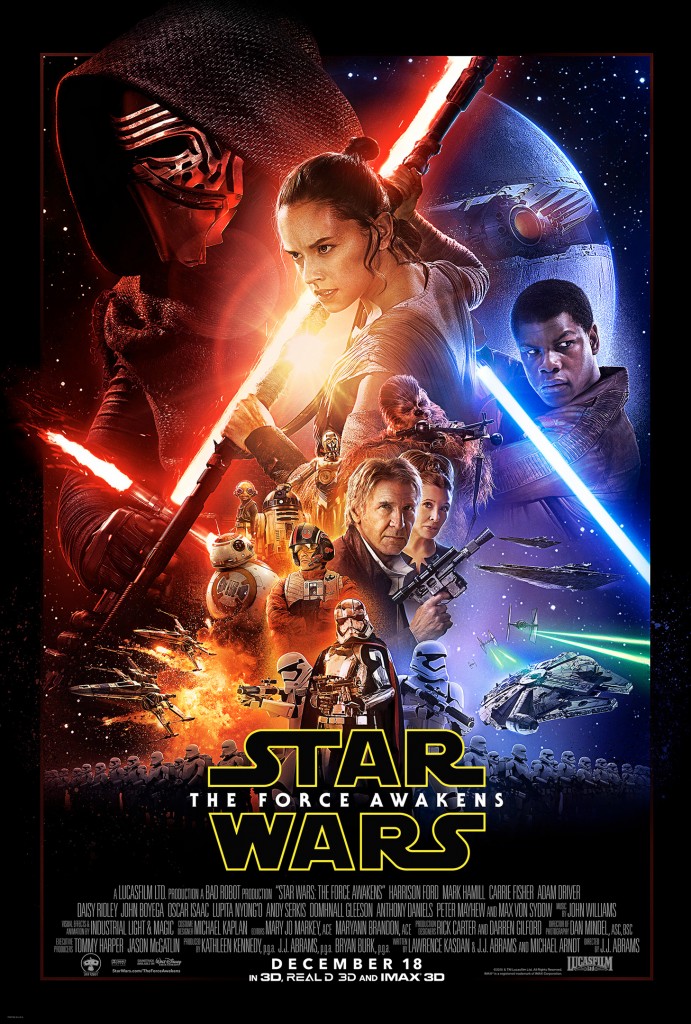 Yet for The Force Awakens, Rey is shown with her staff, and the blue lightsaber in Finn’s hands. One could even say, from a certain point of view, that Star Wars has released a female-lead superhero movie before Marvel or DC. Why would Lucasfilm be fixated on keeping that secret? Should it not be, instead, a point of pride? Fans have to wonder. Was the motivation for hiding Rey’s role really to preserve a “spoiler” – or a lack of corporate courage, motivated by sexist fears that revealing the truth of its female protagonist would hinder, rather than bolster, the movie’s box office success?
Yet for The Force Awakens, Rey is shown with her staff, and the blue lightsaber in Finn’s hands. One could even say, from a certain point of view, that Star Wars has released a female-lead superhero movie before Marvel or DC. Why would Lucasfilm be fixated on keeping that secret? Should it not be, instead, a point of pride? Fans have to wonder. Was the motivation for hiding Rey’s role really to preserve a “spoiler” – or a lack of corporate courage, motivated by sexist fears that revealing the truth of its female protagonist would hinder, rather than bolster, the movie’s box office success?
The decision to conceal Rey’s true role had consequences beyond simply marketing the movie: by keeping that secret, Lucasfilm created the circumstances in which the supply of Rey toys and merchandise have fallen far short of demand. Southern conceded as much to EW, as well as to Reuters, confessing that Lucasfilm “underestimated the character’s popularity” so that “Rey came in with a huge amount of momentum and ultimately above what we were expecting.” Perhaps if they hadn’t been trying so hard to hide how important Rey is, they might have recognized how popular she was going to become. Hasbro’s rationalizations about Rey merchandise at the recent New York Toy Fair offered more of the same.
Moreover, fans have genuine reasons to question whether spoiler-aversion was really the basis for underrepresenting Rey in the marketing and merchandise. Lucasfilm has a pattern of diminishing in the importance of female characters in recent years, including the 2014 Disney Store rollout and the initial waves of Star Wars Rebels merchandise. FANgirl Blog founder Tricia Barr has talked previously about comments she has heard from individuals within the company. Face to face in 2014, a highly placed Lucasfilm employee told her that boys won’t buy Star Wars merchandise with girl characters. On another occasion, a different employee rationalized licensees creating more products for men and diminishing women as valuable customers. With many of the same individuals still making decisions in the Licensing division today, it seems far from implausible that Rey’s exclusion and underrepresentation was not an accidental mistake.
The Force Awakens has now been in theaters over two months – and yet Lucasfilm still has not released a single television commercial or other advertisement featuring Rey with the lightsaber. Official posts on social media, such as Facebook and Instagram, also have avoided those images or video clips. Why is this happening? Surely anyone concerned about the movie’s plot spoilers has seen the film by now. Likewise any potential fans, who’ve heard about the movie but haven’t gone to see it, clearly were not persuaded by the marketing to date. What is the more likely response to a commercial highlighting the duel in the snow and Rey fighting with the lightsaber: “I can’t believe they showed that spoiler eight weeks later!” or “Oh wow, maybe that movie does have something for me in it after all!” If Lucasfilm still lacks confidence to boldly market the truth of its movie nearly two months later, then fans rightly can question how committed the company is to fulfilling that story’s potential.
Hidden Heritage
When fans left the theaters after seeing The Force Awakens for the first time, everyone should have been talking about Rey and how great of a character she is. And they were – to some extent. But what dominated many post-movie debriefings was speculation about who Rey is related to. Luke’s daughter? Han’s and Leia’s daughter? Someone else’s progeny? Unrelated to any iconic existing character? Perhaps Lucasfilm intended to generate this speculation, and hoped it would help promote continuing interest until Episode VIII. In that goal they may have succeeded, but at the cost of a significant distraction from the heart of the story of Episode VII. Instead of drawing attention to Rey’s heroics and her Hero’s Journey within the film, much of the discussion remains focused on the hints and clues in the movie, novelizations, and music. Ironically, by keeping Rey’s heritage a secret and dangling that morsel for the future, the storytellers undermined the attention in the present on the great character they have created.
The identity of Rey’s parents, moreover, is no small piece of trivia in the franchise – it has profound ramifications for the nature of the story being told in the Sequel Trilogy. And depending on what the answer is, it may pose a greater risk of Rey’s potential being squandered in the subsequent films.
Some fans have expressed the hope that Rey is unrelated to the existing heroes. Alan Kistler favors the idea of subverting the trope that female characters must be validated by a father or lineage rather than simply their own heroism. Emily Asher Perrin and Teresa Delgado believe it would affirm the message that anyone can be a hero, not merely the heirs of the wealthy or powerful. The door remains open that Rey, like Poe and Finn, brings new blood to the story.
The danger in this approach to Rey, however, is that The Force Awakens definitively marks the Sequel Trilogy as the continuation of the Skywalker family story – and if Rey is not also part of that family saga, the risk is great that her arc ultimately will become subservient to the arc of the Skywalker heir already present in the story, Kylo Ren f/k/a Ben Solo. To be eminently clear: if Ren-Ben is the only next-generation Skywalker in the story, then the Sequel Trilogy isn’t really about Rey – it’s about Ren-Ben and his role in the family’s legacy to the galaxy. Rey becomes nothing more than an interloper in the Skywalker soap opera. She could nonetheless become a great addition to the franchise and a revered character in her own right, and perhaps she will. But the odds would favor a storytelling fate like Ahsoka Tano, added into the Skywalker-Kenobi storyline in The Clone Wars but ultimately sidelined to serve the arc of the actual central character in the story, Anakin. For both in-universe and real-world reason, having Rey also be a Skywalker sends a powerful and important message that girls can take up family mantles, too.
“The elements align, Kylo Ren. You alone are caught in the winds of a powerful storm. Your bond is not just to Vader, but to Skywalker himself. Leia …”
~ Supreme Leader Snoke
The Force Awakens novelization by Alan Dean Foster, page 140
The Force Awakens junior novelization by Michael Kogge, page 99
Even beyond Rey’s own story arc, having Ren-Ben as the sole Skywalker heir in the Sequel Trilogy poses another risk to the franchise. While some amount of subverting fan expectations is valuable to keeping a franchise fresh, undermining fans’ expectations too much can generate significant backlash. In the case of the Skywalkers, this means the family is supposed be heroic. Luke and Leia are heroes throughout the Original Trilogy; Padmé is a heroine in the Prequels. Anakin is a hero for two-and-a-half movies until his tragic choices consume him, then ultimately choosing redemption with his final act in Return of the Jedi. Having Rey as a next-generation Skywalker continues this legacy. If Ren-Ben is the only Skywalker, on the other hand, then the meta begins to look very different. Perhaps the galaxy would have been better off without the Skywalkers: Chosen One Anakin became Darth Vader and presided over two decades of tyranny, Padmé failed to anticipate or stop the rise of the Empire or her husband’s fall to the dark side, Luke failed to revive a new Jedi Order, Leia failed to keep the New Republic strong or prevent her son’s fall to the dark side, and Ren-Ben has become the new dark warrior inflicting terror with the First Order – and it will fall to a random stranger, Rey, to stop Ren-Ben, bring Luke back to train Jedi, and help Leia bring peace to the galaxy. A decade ago, author Karen Traviss included similar themes in her novels in the Republic Commando and Legacy of the Force series, undermining the Jedi and the Skywalker family as the saga’s heroes. The popularity of the Legends novels never recovered from this subversion of the saga’s themes, and hopefully Lucasfilm has learned the correct lesson from that failure of oversight. While it is possible the Skywalker family might remain heroic without Rey, The Force Awakens sets up a galaxy in which that seems unlikely.
It is important to emphasize that Lucasfilm’s prerelease actions created the fan expectations driving the attention on Rey’s heritage. On numerous occasions in interviews, Kennedy expressed that the Episode movies are the Skywalker family saga, distinct from the other upcoming Star Wars standalone films. The second teaser trailer, premiered at Celebration Anaheim, included the iconic Luke Skywalker dialogue from Return of the Jedi about the Force running in the family. In November’s interview with The Hollywood Reporter for a feature on her and co-star John Boyega, Ridley explained that she knows who Rey’s parents are and replied, in response to a direct inquiry whether the audience would find out in The Force Awakens, “Questions will be answered, absolutely. The main question will be answered.” Likewise, the novelization by Alan Dean Foster and junior novelization by Michael Kogge – which were not finalized until December 16, 2015, one day before the first public showings in U.S. theaters – as well as the Rey’s Story adaptation by Elizabeth Schaefer contain scenes strongly indicating that Kylo Ren knows Rey’s identity as someone more than merely a random girl from Jakku who happens to be powerful in the Force. Taken together, the evidence suggests that Lucasfilm may have changed plans, very late in the production process, about revealing Rey’s heritage in the first movie of the trilogy.
With Rey’s heritage kept secret in The Force Awakens, the question remains whether, just as Episode VII draws so heavily on parallels to A New Hope, the plan for Episode VIII involves a family-heritage “surprise twist” comparable to The Empire Strikes Back. Maybe Rian Johnson’s film will pull it off, as Abram’s recent remarks imply. But in the meantime, the cost-benefit analysis for Rey’s character is very real. Is keeping a revelation for Episode VIII really worth the impact of the ongoing distraction for the next two years? Does it help or hinder Rey, now and in the future, to have fans spending so much time discussing her heritage instead of her heroism? Only time will tell.
Movie’s Message
Compounding the effect of the previous two factors is a third dynamic: the message of the story of The Force Awakens, which undercuts Rey’s importance by comparison to Luke, Anakin, and Ren-Ben. Undeniably Rey is a great female character onscreen, but the underlying arcs of the story fail to signify her as a central protagonist on par with the others.
In A New Hope, Luke dreams of leaving Tatooine behind to find adventure in the galaxy. On his journey in the film he joins the Rebellion, helps rescues a princess from Imperial captivity, discovers his Jedi heritage, receives his father’s lightsaber as a talisman of his heroic quest, and gains a small amount of Force training from his new mentor, Obi-Wan Kenobi. At the movie’s climax Luke uses the Force to fire the torpedoes that blow up the Death Star, achieving a personal triumph on his path to becoming a Jedi as well as saving his friends and ensuring a major victory for the Rebellion.
In The Phantom Menace, Anakin dreams of freedom from slavery and visiting all the stars in the night sky. His journey in the movie includes subtle Jedi guidance from Qui-Gon Jinn to help win the Podrace, travel to glittering Coruscant, and blowing up the Trade Federation’s droid control ship to assist Padmé’s plan to defeat the droid army and retake the palace. At the film’s end, Anakin’s costume change confirms the beginning of his Jedi apprenticeship.
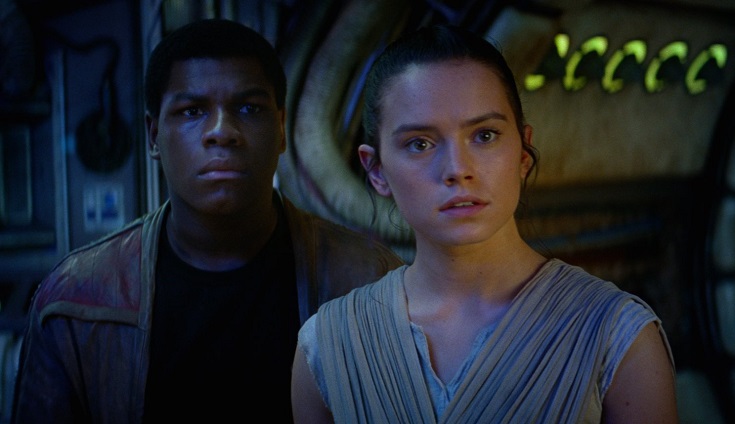 In The Force Awakens, by contrast, Rey receives a far less definitive denouement. She dreams of reuniting with her long-lost family, but learns from Maz Kanata that they’re never coming back; the best she can hope for is a feeling of belonging ahead of her. Rey discovers and accesses Force powers – mind control, telekinesis, and lightsaber dueling – not from mentors Maz or Han Solo, but from the next-generation Skywalker character, Kylo Ren. In the film’s climactic sequences she plays a very indirect role in the destruction of Starkiller Base: opening locked doors for Han and Chewbacca to set explosives, which Chewie detonates, allowing Poe Dameron to fly inside the structure to destroy the oscillator. Rey does not try to assist Han in his showdown with Ren-Ben the way Han intervened to assist Luke at the Death Star; rather, she simply stands by and passively watches events unfold. In the forest duel she is knocked out by Kylo, recovers consciousness due to Kylo inflicting howling pain on Finn’s shoulder, and successfully injures Kylo – but is denied the opportunity to make an active choice between the light and dark sides of the Force in how to finish the duel with him by a literal chasm opening between them. And it is Chewie’s arrival in the Falcon which allows Rey and Finn to escape the planet. In final scenes, Rey embraces Leia warmly and accepts her destiny to travel to find Luke and beseech him to train her – but is denied a clear catharsis on achieving either of her goals. The movie ends without Rey or the audience learning if she has rediscovered her family or successful returned Luke to his destiny as a Jedi Master.
In The Force Awakens, by contrast, Rey receives a far less definitive denouement. She dreams of reuniting with her long-lost family, but learns from Maz Kanata that they’re never coming back; the best she can hope for is a feeling of belonging ahead of her. Rey discovers and accesses Force powers – mind control, telekinesis, and lightsaber dueling – not from mentors Maz or Han Solo, but from the next-generation Skywalker character, Kylo Ren. In the film’s climactic sequences she plays a very indirect role in the destruction of Starkiller Base: opening locked doors for Han and Chewbacca to set explosives, which Chewie detonates, allowing Poe Dameron to fly inside the structure to destroy the oscillator. Rey does not try to assist Han in his showdown with Ren-Ben the way Han intervened to assist Luke at the Death Star; rather, she simply stands by and passively watches events unfold. In the forest duel she is knocked out by Kylo, recovers consciousness due to Kylo inflicting howling pain on Finn’s shoulder, and successfully injures Kylo – but is denied the opportunity to make an active choice between the light and dark sides of the Force in how to finish the duel with him by a literal chasm opening between them. And it is Chewie’s arrival in the Falcon which allows Rey and Finn to escape the planet. In final scenes, Rey embraces Leia warmly and accepts her destiny to travel to find Luke and beseech him to train her – but is denied a clear catharsis on achieving either of her goals. The movie ends without Rey or the audience learning if she has rediscovered her family or successful returned Luke to his destiny as a Jedi Master.
Even more troubling, these same climactic sequences in The Force Awakens strongly suggest that the true emotional themeline of the movie is not Rey’s, but Ren-Ben’s. Threaded through the movie is the family story centered on Kylo Ren and his past: Lor San Tekka mentions it to his face in the opening village sequence; Han and Leia discuss their son and his fate three times, on Takodana, within the Resistance base, and their farewell at the Falcon; Snoke admonishes him about never facing such a test as confronting his father again; Kylo Ren himself admits to Han that he doesn’t know if he has the strength to kill his father; and after Han’s death Snoke declares that the time has come to complete Kylo Ren’s training. The showdown in the forest, though, is not made part of this themeline. Kylo Ren dismisses the relevance of Han Solo – “It’s just us now.” – to make clear that his goal is dispensing with the meddlesome scavenger and traitor who have interfered with his plans, as well as regaining Darth Vader’s old lightsaber that he believes belongs to him. This in turn implies that the fight with Rey is secondary within Ren-Ben’s story arc, and that his murder of his father was the true climax of the movie. The fact that members of the Licensing division predicted that Kylo Ren would be the breakout character from The Force Awakens – that they believed an emotionally unstable patricidal maniac would be more popular with fans than the fierce, strong-willed, highly competent young woman – only gives more reason to question who the true main character of the movie is.
Perhaps another reading of the ending is possible, if the storytellers intended that The Force Awakens draw more upon Return of the Jedi rather than A New Hope for its heroes’ arcs in the third act. The parallels seem to fit: Han and Chewie take down the shields at Starkiller Base, as did Han and Leia and Chewie at Endor; Poe destroys the enemy superweapon, as Lando and Wedge did the second Death Star; Luke confronts Darth Vader and the Emperor and achieves a purely spiritual denouement in redeeming his father, without contributing to the military victory, and his triumph is only bittersweet, capped with a funeral pyre and a brief smile to a trio of Force ghosts – and Rey’s denouement is similarly spiritual in nature, accepting her destiny as a Jedi, with the bittersweet conclusion of no definitive catharsis on family or tutelage. If this interpretation holds up over time, then perhaps the storytellers are setting up Rey’s arc in reverse, and Episode IX will deliver her the climactic equivalent of A New Hope – an ending in which Rey not only fulfills her personal destiny as a Jedi Knight but also attains a war-winning military victory in defeating the First Order once and for all. Yet nothing in The Force Awakens clearly indicates such a plan exists in the story, and it is equally possible that the storytellers have really invested in a trilogy about Ren-Ben’s journey, not Rey’s.
The Importance of Speaking Up
When the Episode VII cast photo was revealed in late April 2014, many fans responded with vocal discontent at the lack of female characters. While some other fans told them to be quiet and trust Lucasfilm to do the right thing, the critics refused to relent. Now we know they were right to keep up the pressure. The role of Captain Phasma was gender-swapped, and the timing lines up not only with fan reaction to the cast photo but also Geena Davis’ visit to Bad Robot to speak about gender equality in entertainment. More recently, for example, there can be little doubt that Abrams would not have personally made a phone call to insist on a reversal of Rey’s “preposterous” exclusion from Hasbro’s Star Wars Monopoly game were it not for the vocal online criticism of the toymaker. The leadership at Lucasfilm may have the best of intentions, but mistakes can still be made – and the only way to proactively prevent them is to ensure the possible errors are vividly apparent to the decision-makers so that the risks cannot be ignored.
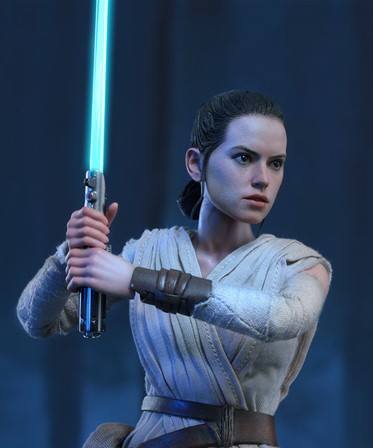 As Tricia’s recent piece for PopSugar reminds us, Lucasfilm unfortunately has a long history of failing its female characters. Leia’s storyline in Return of the Jedi pales to her arcs in A New Hope and The Empire Strikes Back; Padmé launched with an excellent start in The Phantom Menace, but the letdown of her fate in Revenge of the Sith is well documented. Mara Jade and Jaina Solo began with great promise in the Legends tales, but both ultimately saw their potential sacrificed on the altar of the story arc for Kylo Ren’s emo brat predecessor, Jacen Solo. Even in the new era of canon under the supervision of the Story Group, female characters often have fared poorly: the wonderful Asajj Ventress from The Clone Wars was fridged in Dark Disciple simply to serve the manpain of tertiary Jedi Quinlan Vos, and to again reemphasize the morally compromised position of the old Jedi Order; after multiple Legends books gave Luke a girlfriend only to kill her off, Heir to the Jedi repeated the pattern by fridging Nakari to advance Luke’s character arc; and two novels, Lords of the Sith and Tarkin, focused on villainous Imperial protagonists without meaningful roles for female characters at all. The announcement that Leia’s role in “A Princess on Lothal” will be her only appearance on Star Wars Rebels this season also increases the likelihood that Ahsoka Tano’s death will occur to advance the story arc of Darth Vader or Ezra Bridger, rather than a female character or her own legacy.
As Tricia’s recent piece for PopSugar reminds us, Lucasfilm unfortunately has a long history of failing its female characters. Leia’s storyline in Return of the Jedi pales to her arcs in A New Hope and The Empire Strikes Back; Padmé launched with an excellent start in The Phantom Menace, but the letdown of her fate in Revenge of the Sith is well documented. Mara Jade and Jaina Solo began with great promise in the Legends tales, but both ultimately saw their potential sacrificed on the altar of the story arc for Kylo Ren’s emo brat predecessor, Jacen Solo. Even in the new era of canon under the supervision of the Story Group, female characters often have fared poorly: the wonderful Asajj Ventress from The Clone Wars was fridged in Dark Disciple simply to serve the manpain of tertiary Jedi Quinlan Vos, and to again reemphasize the morally compromised position of the old Jedi Order; after multiple Legends books gave Luke a girlfriend only to kill her off, Heir to the Jedi repeated the pattern by fridging Nakari to advance Luke’s character arc; and two novels, Lords of the Sith and Tarkin, focused on villainous Imperial protagonists without meaningful roles for female characters at all. The announcement that Leia’s role in “A Princess on Lothal” will be her only appearance on Star Wars Rebels this season also increases the likelihood that Ahsoka Tano’s death will occur to advance the story arc of Darth Vader or Ezra Bridger, rather than a female character or her own legacy.
In light of this history, both past and recent, fans would be more than justified in worrying that the Sequel Trilogy may succumb to temptation to focus on the male Skywalker heir, Ren-Ben, rather than the new heroine, Rey. After all, one of the themes of The Force Awakens is that – in the eyes of Abrams and Lawrence Kasdan, at least – characters ultimately will regress to their basic personalities. After Ben’s betrayal traumatized the family, Han reverted to his tenuously financed smuggler life, Leia focused exclusively on her work in opposing the resurgent Imperial threat, and Luke ran off and left his friends behind, just as he did to face Vader at Endor. If this is true of characters in stories, then it can be true of storytellers in the real world, too. During its production, Colin Trevorrow expressed his intention for Jurassic World to center on the character arc of a strong female lead; the movie he actually delivered, though, hamstrung her story in favor of the male lead. While Kathleen Kennedy has spearheaded the promising start of the Sequel Trilogy, her five-year contract to lead Lucasfilm ends in 2017. Fans have been given no promise that she will retain the authority to see it through and ensure the men she entrusted to continue the Skywalker family saga don’t revert to the longstanding Star Wars habit of failing to deliver on the promise of female leads.
Too often female characters in Star Wars have started off great, and ended poorly. Rey deserves better – and fans must continue to speak up so that Lucasfilm’s creative teams cannot lose sight of the risks ahead of them.

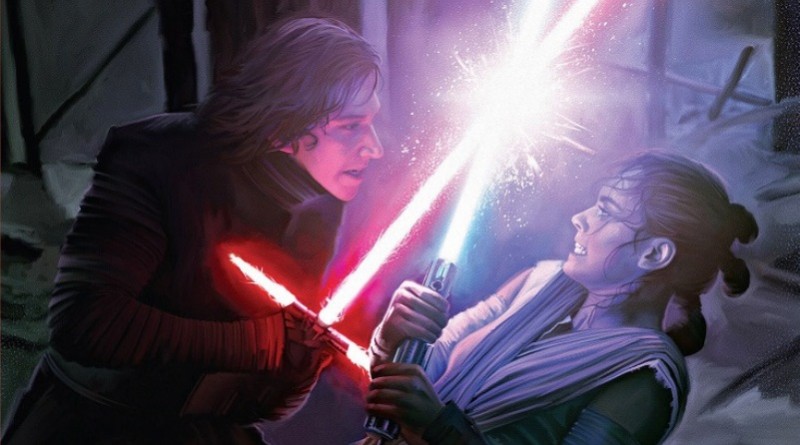








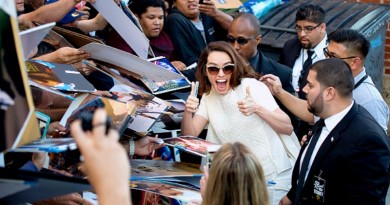
Pingback:Finding Rey: Beyond The Force Awakens Film – FANgirl Blog
I hope that VIII will continue to focus on Rey,s journey to become a Jedi. I also hope she will not become Fin or Poe’s ” girl”. I think that if they make her heritage meaningless ( not related to anyone we know) it would disappoint a lot of fans. It has been stated by the director of IX that she is related to someone we have all met before. I believe she should be the focus of the next two movies, after all the attention she has received it should be obvious to Lucasfilm. Starwars needs her as the hero of this trilogy all the way through to redeem Ren, and bring balance to the Force.
This article includes a lot of useless worrying. I think everyone agrees that Rey was the most awesome character in Ep. VII. Kylo’s tantrums made sure of that. You can’t blame the creators of Ep. VII for developing other main characters the way they did, and it would have been totally weird if Rey got in the middle of Han trying to reconnect with his son. I thoroughly enjoyed all Star Wars movies and can’t wait for the next several to be released. It is very clear to me that Rey is the main focus of the trilogy, which no one should have a problem with as long as she is awesome(like in Ep. VII).
I disagree with the complaining that Rey did not get involved enough in the attack on Star Killer Base. All she wanted to do in this movie was go home to wait for her family to return and no one can blame her for that. The struggle of the resistance wasn’t her problem until she got sucked in against her will. This happened to Luke in the beginning of Ep. IV, opposed to Rey being compelled to assist in the cause about halfway through Ep. VII(she likely would have returned home after delivering the map).
It is important that Kylo, as the antagonist, is developed more thoroughly than Vader. I believe audiences are less likely to embrace/fear the antagonist without any development of his background nowadays. I just hope he is less of a toddler next episode and fully embraces the dark side, because I believe Rey will need a formidable enemy.
Pingback:Resurrecting Legends: Is the Star Wars Reboot Gendered? – FANgirl Blog
Pingback:Episode IX Developments: Colin Trevorrow Out – FANgirl Blog
Pingback:The Problems With Rey Random: A Storytelling Analysis – FANgirl Blog
Pingback:Rey At Risk Revisited: The Danger Signs From The Last Jedi – FANgirl Blog